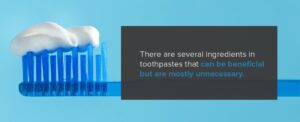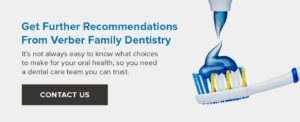Supposedly, four out of five dentists agree. If that is the case, then why is it so confusing to walk down the toothpaste aisle? With dozens of brands and varieties promising everything from white teeth to healthy gums to fresh breath, it’s hard to make an informed choice. When did toothpaste get so complicated? It’s time to ignore all the packaging and marketing and get back to basics.
Toothpaste has a pretty simple job to do. The best way to select a toothpaste is to look at some of the common ingredients, both good and bad, and consider their purpose.
The Good
To be effective at maintaining oral health, toothpaste needs to provide two things: fluoride protection and fresh breath.
Fluoride Protection
Above all else, toothpaste delivers topical fluoride to the teeth. Fluoride is nature’s way of repairing small areas of demineralization in the enamel before they become full-blown cavities requiring fillings, and fluoride toothpaste is the best way to get it.
Fresh Breath
Toothpastes contain flavoring agents to give that fresh feeling. It’s more of a cosmetic benefit than a dental health concern, but nobody’s a fan of bad breath. If you are choosing a product that has the American Dental Association seal of approval, you can be assured that it will not contain any decay inducing sugars.
The Bad
When choosing oral care products, there is one major ingredient to avoid if you want to preserve and strengthen enamel:
Abrasive Particles
Mild abrasives in toothpaste are used to break up plaque and debris. This grit is usually hydrated silica. The level of abrasiveness depends on the size and shape of these particles. Whitening toothpastes, for example, are highly abrasive and should be avoided.
They are not effective at whitening, and they can cause damage to your teeth and gums. Recent studies have shown that the Relative Dentin Abrasivity (RDA) of toothpaste has a more direct link to gum recession and tooth wear than the stiffness of toothbrushes or the method of brushing.
Be sure to avoid any toothpastes that contain activated charcoal. Too often, unregulated toothpastes containing extremely harsh particles end up causing serious enamel damage and permanent discoloration.
The Maybe
There are several ingredients in toothpastes that can be beneficial but are mostly unnecessary. As long as these ingredients don’t appear in conjunction with abrasive particles and still provide fresh breath and plaque defense, the toothpaste should be an adequate option.
Sodium Lauryl Sulfate
Sodium Lauryl Sulfate (SLS) is a soap that gives many types of toothpaste a foamy texture. The foaminess may feel good, but SLS is superfluous. It is the mechanical action of the toothbrush that cleans the teeth. In addition, some individuals are sensitive to this ingredient and get ulcers in their mouth as a result.
Desensitizers
People who suffer from sensitive teeth can get some palliative relief from a common desensitizer called potassium nitrate, which is often found in toothpaste for sensitive teeth. However, if there is pain coming from a cavity or infection, only your dentist can help.
Antimicrobials
When toothpastes market antibacterial properties and effectiveness in treating gum disease, they often contain Triclosan. There are some studies that suggest Triclosan helps reduce gingivitis, but there is also some recent research that calls its safety into question. The bottom line is that if you are brushing properly and getting the germs off your teeth, Triclosan is probably an unnecessary additive.
Suitable Oral Care Products
More important than the toothpaste you use is the time and effort you put into brushing and flossing properly. Nonetheless, here are a few products recommended by Verber Family Dentistry:
- For people with tooth sensitivity, Sensodyne ProNamel has a low RDA, no SLS, and contains potassium nitrate.
- For old fashioned people, Colgate Regular is time tested and has a low RDA.
- For people with dry mouth, Biotene toothpaste has a low RDA, no SLS, and helps moisten.
- For people looking for natural ingredients, Tom’s of Maine Clean and Gentle with Fluoride has a low RDA and no SLS.
Get Further Recommendations From Verber Family Dentistry
It’s not always easy to know what choices to make for your oral health, so you need a dental care team you can trust. Call 717-737-4337 or use our online contact form to learn more about Verber Family Dentistry’s award-winning dental services today.
Written by: Dr. Michael Verber, DMD







